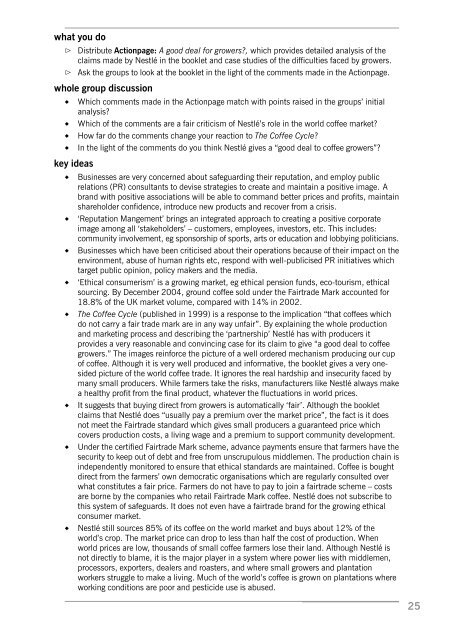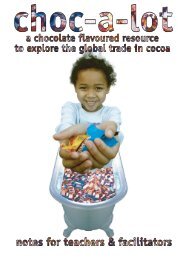Cost of coffee.indd - RISC
Cost of coffee.indd - RISC
Cost of coffee.indd - RISC
Create successful ePaper yourself
Turn your PDF publications into a flip-book with our unique Google optimized e-Paper software.
what you do<br />
s Distribute Actionpage: A good deal for growers?, which provides detailed analysis <strong>of</strong> the<br />
claims made by Nestlé in the booklet and case studies <strong>of</strong> the difficulties faced by growers.<br />
s Ask the groups to look at the booklet in the light <strong>of</strong> the comments made in the Actionpage.<br />
whole group discussion<br />
◆ Which comments made in the Actionpage match with points raised in the groups’ initial<br />
analysis?<br />
◆ Which <strong>of</strong> the comments are a fair criticism <strong>of</strong> Nestlé’s role in the world c<strong>of</strong>fee market?<br />
◆ How far do the comments change your reaction to The C<strong>of</strong>fee Cycle?<br />
◆ In the light <strong>of</strong> the comments do you think Nestlé gives a “good deal to c<strong>of</strong>fee growers”?<br />
key ideas<br />
◆ Businesses are very concerned about safeguarding their reputation, and employ public<br />
relations (PR) consultants to devise strategies to create and maintain a positive image. A<br />
brand with positive associations will be able to command better prices and pr<strong>of</strong>its, maintain<br />
shareholder confidence, introduce new products and recover from a crisis.<br />
◆ ‘Reputation Mangement’ brings an integrated approach to creating a positive corporate<br />
image among all ‘stakeholders’ – customers, employees, investors, etc. This includes:<br />
community involvement, eg sponsorship <strong>of</strong> sports, arts or education and lobbying politicians.<br />
◆ Businesses which have been criticised about their operations because <strong>of</strong> their impact on the<br />
environment, abuse <strong>of</strong> human rights etc, respond with well-publicised PR initiatives which<br />
target public opinion, policy makers and the media.<br />
◆ ‘Ethical consumerism’ is a growing market, eg ethical pension funds, eco-tourism, ethical<br />
sourcing. By December 2004, ground c<strong>of</strong>fee sold under the Fairtrade Mark accounted for<br />
18.8% <strong>of</strong> the UK market volume, compared with 14% in 2002.<br />
◆ The C<strong>of</strong>fee Cycle (published in 1999) is a response to the implication “that c<strong>of</strong>fees which<br />
do not carry a fair trade mark are in any way unfair”. By explaining the whole production<br />
and marketing process and describing the ‘partnership’ Nestlé has with producers it<br />
provides a very reasonable and convincing case for its claim to give “a good deal to c<strong>of</strong>fee<br />
growers.” The images reinforce the picture <strong>of</strong> a well ordered mechanism producing our cup<br />
<strong>of</strong> c<strong>of</strong>fee. Although it is very well produced and informative, the booklet gives a very onesided<br />
picture <strong>of</strong> the world c<strong>of</strong>fee trade. It ignores the real hardship and insecurity faced by<br />
many small producers. While farmers take the risks, manufacturers like Nestlé always make<br />
a healthy pr<strong>of</strong>it from the final product, whatever the fluctuations in world prices.<br />
◆ It suggests that buying direct from growers is automatically ‘fair’. Although the booklet<br />
claims that Nestlé does “usually pay a premium over the market price”, the fact is it does<br />
not meet the Fairtrade standard which gives small producers a guaranteed price which<br />
covers production costs, a living wage and a premium to support community development.<br />
◆ Under the certified Fairtrade Mark scheme, advance payments ensure that farmers have the<br />
security to keep out <strong>of</strong> debt and free from unscrupulous middlemen. The production chain is<br />
independently monitored to ensure that ethical standards are maintained. C<strong>of</strong>fee is bought<br />
direct from the farmers’ own democratic organisations which are regularly consulted over<br />
what constitutes a fair price. Farmers do not have to pay to join a fairtrade scheme – costs<br />
are borne by the companies who retail Fairtrade Mark c<strong>of</strong>fee. Nestlé does not subscribe to<br />
this system <strong>of</strong> safeguards. It does not even have a fairtrade brand for the growing ethical<br />
consumer market.<br />
◆ Nestlé still sources 85% <strong>of</strong> its c<strong>of</strong>fee on the world market and buys about 12% <strong>of</strong> the<br />
world’s crop. The market price can drop to less than half the cost <strong>of</strong> production. When<br />
world prices are low, thousands <strong>of</strong> small c<strong>of</strong>fee farmers lose their land. Although Nestlé is<br />
not directly to blame, it is the major player in a system where power lies with middlemen,<br />
processors, exporters, dealers and roasters, and where small growers and plantation<br />
workers struggle to make a living. Much <strong>of</strong> the world’s c<strong>of</strong>fee is grown on plantations where<br />
working conditions are poor and pesticide use is abused.<br />
25




